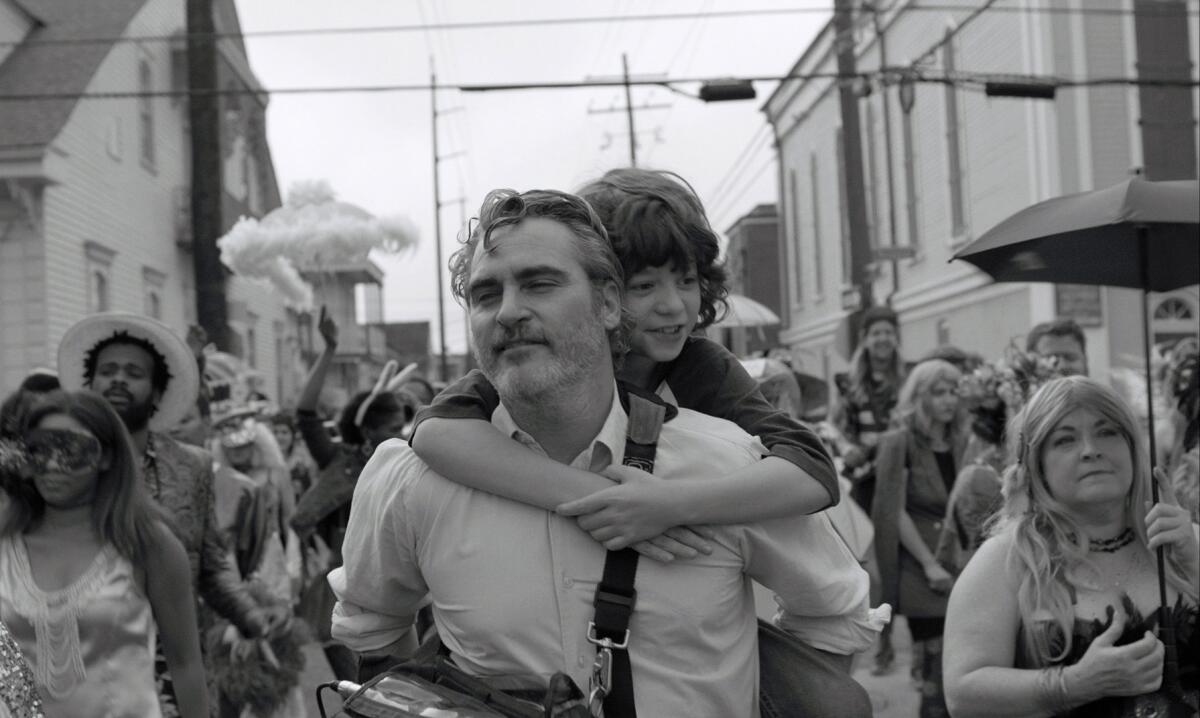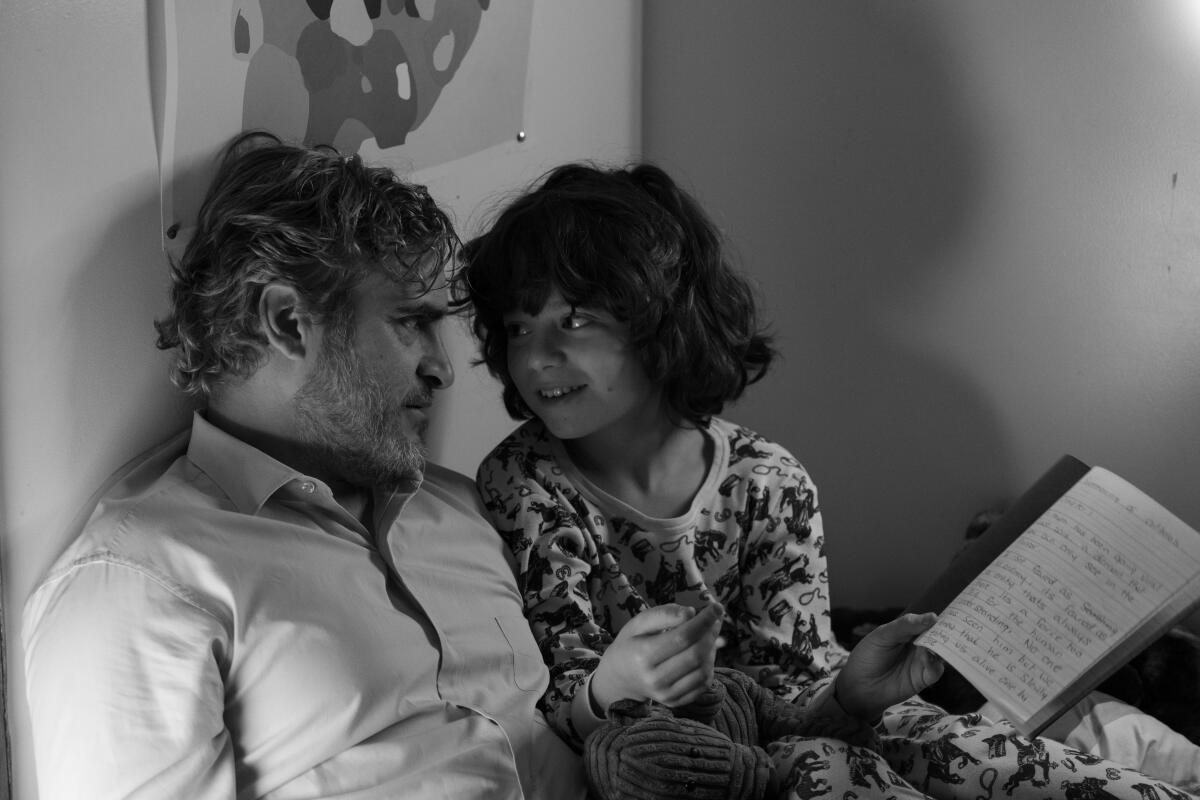Review: ‘C’mon C’mon’ is a joyful, compassionate reminder Joaquin Phoenix can play nice guys too

- Share via
The Times is committed to reviewing theatrical film releases during the COVID-19 pandemic. Because moviegoing carries risks during this time, we remind readers to follow health and safety guidelines as outlined by the Centers for Disease Control and Prevention and local health officials.
Mike Mills makes movies that feel like falling in love with your best friend. The familiar becomes momentous and the ordinary turns incandescent; it’s like he’s telling us, again and again, that the things we’re looking for are very often right in front of us, if we’d only pay them the right kind of attention.
His new film, “C’mon C’mon” — a giddily impatient title for a movie that is anything but — is all about that kind of attention and the discoveries it can yield, about others and about ourselves. And if its rueful, midlife nostalgia doesn’t carry quite the same current of vibrant, urgent empathy as “20th Century Women” or “Beginners,” the small, polished pebbles of wisdom it unearths are still a pleasure to observe as they’re sent skimming across the surface of a delicate, compassionate film. For all its indulgent introspection, Mills’ latest remains miraculously unpunchable.
It’s Johnny’s job to pay attention. As played by Joaquin Phoenix, whose lovely rumpled sincerity here reminds us that “soulful everyman” is as much part of his repertoire as “psycho,” he’s the ruminative, Ira Glass-esque creator of a radio show that involves travelling the country to ask young people about their ideas of the future. Alone, later on, in various anonymous hotel rooms, Johnny listens back to the tapes and adds musings of his own about these American lives, little fragments of commentary that amount to a snapshot of his state of mind. There’s a certain lifestage weariness in him that is only underscored by the genuine pleasure he takes from his (unscripted) encounters with these exuberant teens and tweens, who can’t help but emit the optimism of youth even though their actual views — on climate change, politics, the sheer uselessness of adults — can be wryly pessimistic.
After mining his own family in “Beginners” and “20th Century Women,” director Mike Mills enjoys a breakthrough moment with his sweetly moving new film, “C’mon C’mon.”
Johnny has built a professional career in the image of his own interests and personality, rather than the other way around, and if there is the very definite sense that he — like most of Mills’ protagonists — comes from the kind of bohemian-leaning, well-educated, white-middle-class background that affords him such luxury, there’s no sense that Johnny, or Mills, is unaware of all that. Self-awareness without self-importance or archness is one of the hallmarks of the filmmaker’s work, and it’s this quality along with a knack for performances that siphon the sap out of inherently sentimental situations, that pulls “C’mon C’mon” back from the brink whenever tweeness threatens.
It threatens fairly often; the basis of the barely-there plot is the relationship between Johnny and his nephew Jesse (Woody Norman), a precocious 9-year-old, with bright, considering eyes and a mop of unruly, untamed hair to rival his mop of unruly, untamed opinions. His mother, Johnny’s L.A.-based sister Viv (a terrific, warm, hassled Gaby Hoffmann) has been a little estranged from New Yorker Johnny since the death of their mother, and since Johnny overstepped by offering well-meant but unhelpful advice about Viv’s personal life. All of the conflicts in “C’mon C’mon” are like that — more made of regret than rancor, they arise from goodhearted people with only the kindest of motives trying to be too nice to each other, trying to fix people in ways they don’t want, or need, to be fixed.
When Jesse’s father, Viv’s bipolar partner Paul (Scoot McNairy) has a breakdown, Viv takes it on herself to help him through: One of the strengths of Mills’ loose-limbed screenplay, and of Hoffmann’s generous, understated turn, is the justice it does to the people — often women — who instinctively take on the duties of care for others, even at the cost of caring for themselves. And so Johnny, who is gently mending the sibling rift and staying with his sister, steps into the breach of looking after Jesse, even to the point of bringing him back to New York when Viv needs more time for Paul.
Mills’ past films have fixated on parent/child relationships with a kind of dazzled wonderment at the immensely impressive people our parents probably were, if viewed from outside the prism of our own childhoods. This time, with Mills a father himself, the focus shifts downward. Johnny, having the clearer perspective of an uncle coming to stand-inparenthood at a later stage of the kid’s development, learns to admire just how much of a person Jesse is, even as he’s changing right before his eyes.

And in Jesse, Mills creates an endearing oddball who is sometimes adorable and sometimes flat-out obnoxious, the way children are. One of his weirdest quirks is his habit of pretending to be a Victorian urchin on the run from the orphanage. Initially it alarms Johnny, but he learns, as Viv has, to accept it, and maybe even to understand it. Jesse isn’t ghoulishly envisioning his parents’ death or play-acting the hardships of some Oliver Twist fetish, he’s imagining the moment he can tell his tale of woe to a kindly stranger who’ll take him in. His isn’t a fantasy of being lost, but of being found; it’s not about being abandoned but about being chosen, and paid attention to, over and over and over again.
This isn’t the stuff of massive revelation, but the interactions crackle with authenticity, while the stirring gorgeousness of Robbie Ryan’s black-and-white photography, and a soundtrack peppered with Debussy and Mozart (Paul is a classical musician), lend an epic dimension to even the most intimate moments. One shot, of a cab pulling into a deserted street at dawn — with the smoggy air creating filtered layers of palm trees, houses, skyscrapers and sky while Aaron and Bryce Dessner’s glistening score swells — is as magical and romantic a vision of Los Angeles as we’ve recently seen.
But though they move through grand monochrome landscapes, these are highly verbal people in a highly verbal film. Incidents play out only to be immediately narrativized, in phone calls or whispered bedtime conversations — the time Jesse ate ice cream at night; the time he wandered off on the street; the time they (in the film’s most schematic and least convincing moment) went for an impromptu primal-scream session in the woods. Spontaneous reactions are second-guessed aloud: “He asked me about relationships ending and I made it into a weird joke. Why did I do that?” murmurs Johnny. And even when none of the characters are speaking, there are snatches of text, often voiced-over, culled from an eclectic array of literary sources: Kirsten Johnson, L. Frank Baum, Claire A. Nivola, Jacqueline Rose.
No wonder, amid all the chatter and self-examination, Jesse so enjoys using Johnny’s directional microphone, sweeping it this way and that over beaches, in parks and on busy New Orleans streets. It’s one way to focus, to pull something small and precise out of the general cacophony of life, to clean it off and preserve it forever from the onrush of time. It’s one way to maintain a record of random little moments that will otherwise be forgotten, but that, once saved, can describe a whole afternoon, or a whole week, or a whole childhood.
It’s unusual for a film’s relative formlessness to feel so satisfyingly good in the final stretch. But although “C’mon C’mon” is loose and wandering to the point it can seem like it’s not about anything, in the end we realize, in a sudden gobstopper-blub of emotion, that it’s that way because, just like a promise made as the movie fades, it wants to remind us of everything.
Mike Mills directs Joaquin Phoenix in an effective examination of work and family life, one of the early Telluride ‘21 highlights.
'C'mon C'mon'
Rating: R, for language
Running time: 1 hour, 48 minutes
Playing: AMC the Grove 14, Los Angeles; the Landmark, West Los Angeles; AMC Burbank 16; AMC Burbank Town Center 6
More to Read
Only good movies
Get the Indie Focus newsletter, Mark Olsen's weekly guide to the world of cinema.
You may occasionally receive promotional content from the Los Angeles Times.












